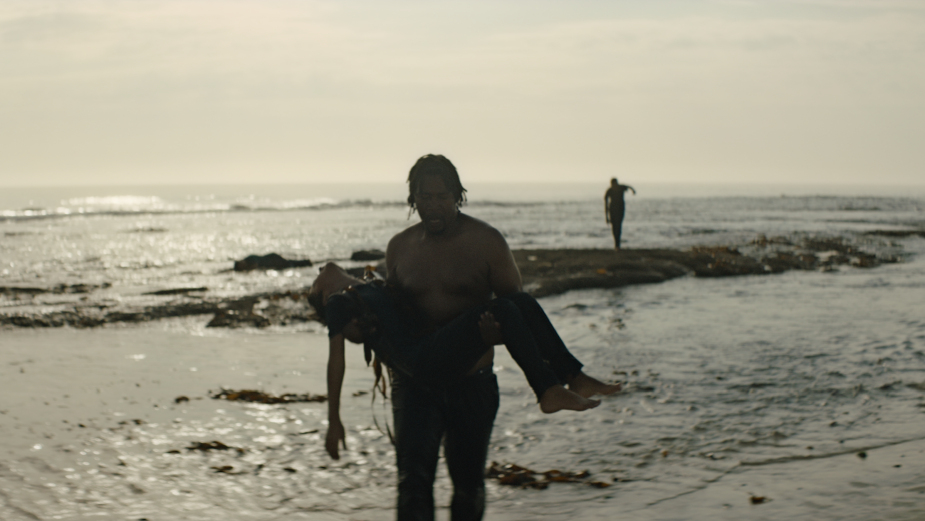
Re\Entry: How Great Guns’ Ben Brand Found New Life in Andy Weir’s Classic Short Story

What happens when you die? In 2009, the American writer Andy Weir (whose debut novel The Martian has since been adapted into a feature film starring Matt Damon) put forward an answer to the age-old question in the form of a short story. Entitled The Egg, the tale imagines an afterlife where the reader is confronted by a God with a distinctive middle-management feel.
For the sake of avoiding spoilers, the story can be summed up by acknowledging a deep level of connection between all human life. Its impact was immense, and caught the imaginations of countless creators. One of which was director Ben Brand, whose latest project sees the story brought to screens in the form of Re\Entry, a cinematic adaptation of The Egg.
To pick through his vision for the unique project, as well as reflect on the process of putting it all together, LBB spoke to Ben Brand…
Above: Ben Brand’s Re\Entry, an adaptation of novelist Andy Weir’s short story The Egg, answers the question of what happens to us after death.
LBB> Congratulations on a fascinating project - what inspired you to adapt this short story?
Ben Brand> The original short story from Andy Weir, called The Egg, was one of those stories that really went viral when it was originally released back in the day. I remember reading it online for the first time and it giving me goosebumps. It was inspiring in a way that made me feel connected to everyone. It was a feeling that I always had about the world, so I connected to it on a personal level.
LBB> So what was the process of putting this all together?
Ben> I immediately sent Andy Weir an email, asking him if it was possible to make a film based on the story. Within half an hour he replied and said ‘sure, as long as it’s not for profit’. So with that, I started writing.
Across the next few years, we’d had loads of deadlines and options for short film competitions. And every year before the competition, always around a month before, I would get the script, read it, and think ‘that’s not it’. And every year we would throw it away.
But one year we’re trying again, and I happened to hear the voice of this actor, Johnny Bang Reilly, and it just clicks in my head - this is the voice of God. It wasn’t like Morgan Freeman or the classical ‘God voice’. He was a guy from England, and also sounded quite vulnerable. So I pitched the idea to him and he really liked it. I mentioned that I didn’t know if the script was working for me, so asked him if he could record the voices of both characters so I could listen. And that’s what he did. He recorded it on his iPhone and set it to me, and I listened to it all week. I sent it to my cameraman and producer and they were really enthusiastic about it.
Ultimately we stuck with this original recording for the final film, so Johnny provides the voice of God and the man who’s died - so we just made it sound a bit different. It’s interesting because, in a way, they’re the same being. It plays into that central idea that the man will ultimately become a God himself.
LBB> The film features snapshots of places and people all over the world. Did you shoot all of that, or was it stock footage?
Ben> We shot everything. That was one thing I maintained from the start - I didn’t want a single shot that we hadn’t done ourselves. It was very important to me as a filmmaker to be able to clearly say that there was no stock material, no random shots all put together. Every shot that’s in there was thought-out and specifically recorded for each moment in the film. We shot in Namibia, Thailand, Iraq, the Netherlands and Belgium over a five-month period, which included about 20 filming days (which is crazy for a short!). I was so blessed to have a crew that wanted to do it all for nothing.
Aside from our main character, played by Issaka Sawadogo, the rest of the cast were all non-actors. For example, when we went to Namibia for our first shooting period we went to this tribe named the Himba tribe, right in the middle of nowhere. It’s really beautiful there. Our way of shooting was to capture everything authentically, finding things that were actually there.
It made me realise that, by travelling all over in such a short period of time and meeting all these different people, that we’re really all the same. The connectedness that we explore in the film is really what I felt on the trip back. I think, in real life, if you meet all these different people from around the world with different faiths and beliefs, we’re all the same in essence. It was really beautiful to experience and I’m also really happy we were able to shoot the film back before the Coronavirus pandemic, because I don’t think we could have made the film otherwise.
It’s been a miserable year in so many ways. So in some ways it’s more relevant. We’re all one and we should all be a little nicer to each other. That's why I hope this film can evoke even the slightest positive feeling and love for ourselves and also everyone around us.
LBB> The film has a beautiful score. Did you get an original composition?
Ben> Yes, I spoke to a guy I already work with, who’s amazing at creating emotionally-driven music. So I finished the film and spoke to him, and we worked on it back and forth for about two months. I wanted the sound of an organ to feature predominantly. It’s such a big, universal sound in a way I really love. It’s also a sound associated with death - with the church, and funerals. So that’s something that fits for this project.
LBB> The original story is almost exclusively dialogue. What was it like to kind of have the freedom of a blank canvas in terms of the visual and sonic elements?
Ben> It was liberating, in a way, and also challenging because you can do anything. The dialogue in the original story is more of a point of view, whereas we made this a more direct conversation between two people. I think I made a couple of small changes and additions to bring it a little more up to date.
I didn’t want it to be two people in a white room talking to each other, I didn’t want a cliche setting. We had a few different ideas for the setting and the conversation, but when I heard the voice of Johnny, and the idea of a normal conversation that gradually gets crazier and crazier just stuck with me.
I imagined it getting bigger and bigger and bigger, but still connected in a way. It’s about growing up, and having a continuous flow that goes from a baby walking, to kids running in the street, through the jungle, everything coming together.
LBB> Let's imagine that this really is the way the world works. Who would you most want to be reincarnated as next?
Ben> Great question! When I was thinking about it, I initially thought of a few people, but then moved on to think about certain periods of time instead - like the pyramids, the old east, the golden era. Then I thought: shit was miserable for most people back then, I don’t want to go back there! So please let me go far into the future instead and be whoever, just so I can see where we are going.













